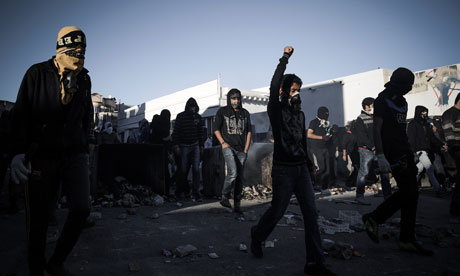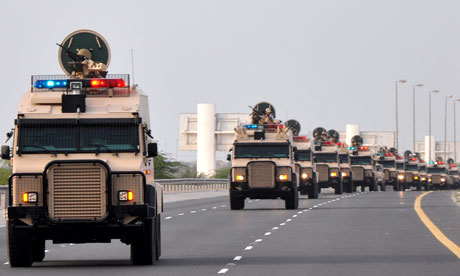The focus here is to discuss
Bahrain current political status. The interesting part of this conflict in
relation to some of the other MENA countries currently dealing with protest or
revolt is the odd stand still the country is currently in. This is a small
picture painted of the current situation in Bahrain.
Ebrahim Aqa-Mohammadi, a member of
Iran’s Majlis National Security and Foreign Policy Committee, said on Saturday,
“Countdown has started for the overthrow of Al Khalifa regime.”1 This
was a big statement the he made and pointed to the second anniversary of the
outbreak of the popular uprising in the Persian Gulf rule, saying, “The
inequality of wealth distribution in Bahrain and the ban on political freedoms
have persecuted the people of Bahrain and ultimately incited them against the
regime.”1 At the start of the protest on 2011 Anti-government
protesters have been holding peaceful demonstrations across Bahrain since
mid-February 2011, calling for a reform of the government.

Yet, the monarchy does not want to
lose its power; it seems to want to go down swinging. By this I mean, violence
against the peaceful protesters escalated after a Saudi-led conglomerate of
police, security and military forces from the Persian Gulf Cooperation Council
(PGCC) member states - Saudi Arabia, Kuwait, the United Arab Emirates, Oman and
Qatar - were dispatched to the tiny Persian Gulf kingdom on March 13 to help crack
down on peaceful protesters. 3
 As long with regional supporters,
one should note that Bahrain is home to the US Navy’s Fifth Fleet, which
patrols the Persian Gulf, through which much of the world’s oil passes. If the
monarchy is toppled, or if the crackdown takes an even bloodier turn, the Fifth
Fleet could be forced to leave.2 Predictably, the Western allies of
the Bahraini regime have some underlying self-serving reasons and do not seem
to have a desire aiding in democratic talks between the two contesting parties.
As long with regional supporters,
one should note that Bahrain is home to the US Navy’s Fifth Fleet, which
patrols the Persian Gulf, through which much of the world’s oil passes. If the
monarchy is toppled, or if the crackdown takes an even bloodier turn, the Fifth
Fleet could be forced to leave.2 Predictably, the Western allies of
the Bahraini regime have some underlying self-serving reasons and do not seem
to have a desire aiding in democratic talks between the two contesting parties.
This is an interesting problem in
that usually western powers are all for democratic transitions but it seems
that no regional or western support is going to be given the protestors who
want a democratic transition. Yet, the Bahrain people who continue to protest
in the hundreds of thousands want a new government. So what will give? The regime with unreleanting support, or half a nation of protestors?
Bib
1.
ASH.
"PressTV - Countdown Starts for Collapse of Al Khalifa in Bahrain: Iran
MP."PressTV - Countdown Starts for
Collapse of Al Khalifa in Bahrain: Iran MP. N.p., n.d. Web. 2013.
<http://www.presstv.ir/detail/2013/02/16/289219/bahraini-regime-on-brink-of-collapse/>.
2.
MAHDI,
MAZEN. "Editorial." BostonGlobe.com. Boston GLobe,
n.d. Web. 2013. <http://www.bostonglobe.com/editorial/2013/02/20/bahrain-conflict-king-hamad-bin-isa-khalifa-must-offer-more-than-talk/Q3WZcLfpSSmICpnEM0FIKJ/story.html>.
3.
"How
Relevant Is the GCC?" - Inside Story. N.p., n.d. Web.
22 Feb. 2013.
<http://www.aljazeera.com/programmes/insidestory/2012/12/2012122684843236735.html>.
No comments:
Post a Comment